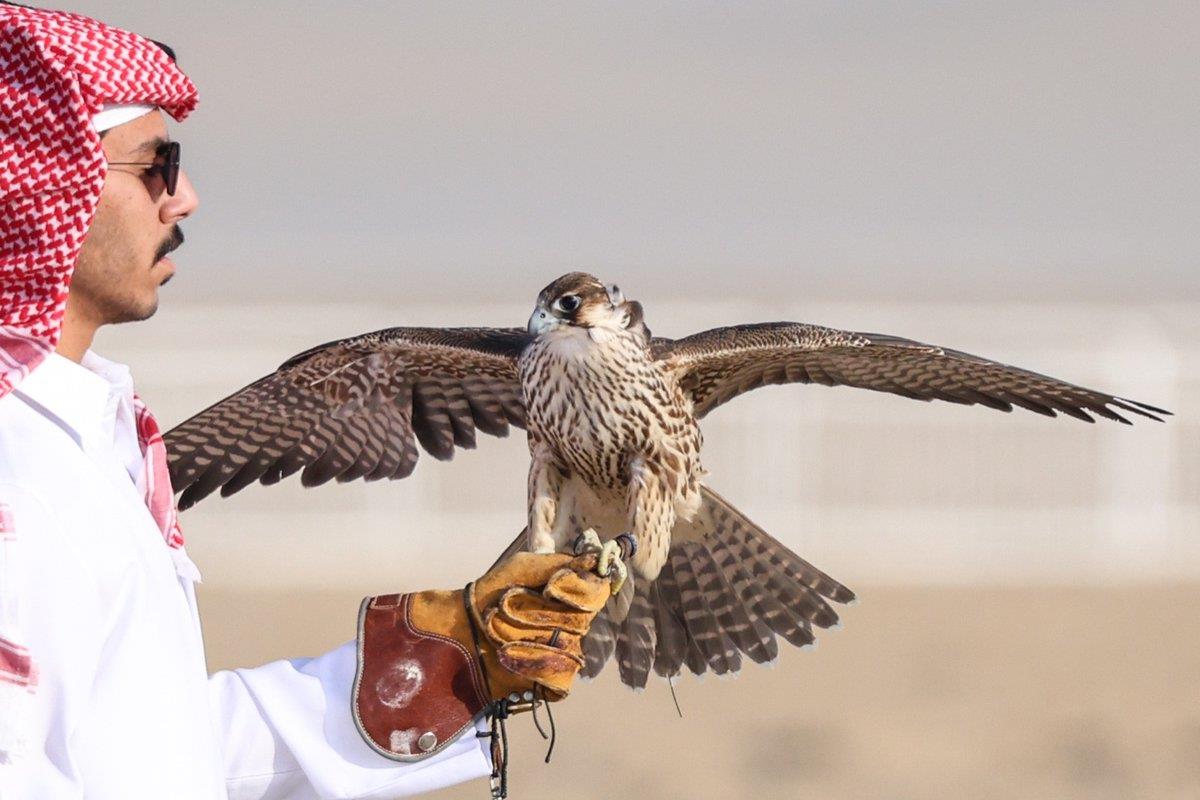
Qatari Falconry Archive: Mammoth Project To Maintain Cultural Legacy
Doha, Qatar: It is well known to all people that preserving the cultural and historic identity of nations requires accurate vision and benchmarks in documentation, as long as this identity is highly significant in safeguarding heritage, particularly the Intangible cultural heritage, which comprises practices, mores, knowledge, and skills bequeathed by generations.
A wide diversity of groups constantly innovates in this heritage in alignment with their environments and interaction with nature, thereby enhancing the feelings of identity and continuation.
Accordingly, Qatari Society of Al Gannas (AGQS) are making unwavering efforts in advancing its falconry archive project, which was commenced many years ago, which has clearly enabled AGQS to collect several sources and references of falconry heritage, along with oral narratives and documentary videos that document hunting and falconry expeditions.
Speaking to Qatar News Agency (QNA), academic researcher and member of the Union of Arab Historians, Dr. Omar Al Ajli, stated that these outputs helped maintain the inveterate cultural legacy, in terms of mores, arts and language to ensure they are tightly kept in memories, highlighting that archiving contributes to storing information and strengthening collective memory.
Archiving process ensures the protection of this legacy with its overall historical facts against manipulation and forgery through accurate documentation for the benefit of generations to come, since archiving offers primary sources and documents that can be cited in academic research and history, thereby nurturing the humanitarian knowledge, highlighted Dr. Al Ajli.
He underlined that archiving is a core pillar of the civilizational path and a strong catalyst of cultural development and diversity to forge bridges of communication among generations, in pursuit of preserving the intellectual property rights of authors by documenting and legally safeguarding their works.
The State of Qatar is a hub of rich and diverse cultural legacy which stockpiles the Qatari elements of falconry that combines practices, traditions and knowledge and illuminates the unique identity of the community, Dr. Al Ajli highlighted, indicating that Qatar's interest in the intangible cultural legacy is predicated upon a combination of key references, including its constitution and the Qatar National Vision 2030.
In confirmation of its commitment to safeguarding the cultural legacy, Dr. Al Ajli, affirmed that AGQS strives to support falconry within its Arab and human scope by backing hunters and organizing their activities, in addition to managing various events related to hunting and representing hunters in regional and international contests.
Launched in 2015 to document the history of hunting and falconry, the archive is a major step in preserving this intangible heritage, in terms of numerous positive aspects such as maintaining falconry traditions as the core pillar of the Qatari and Gulf heritage, he added.
Chairman of AGQS's Board of Directors, Ali bin Khatam Al Mahshadi, highlighted to QNA that the society took upon itself the mission of documenting falconry to be maintained for the next generation, emphasizing that its operation is not restricted to this legacy, but rather goes beyond to include other significant projects, in terms of returning falcons to their natural habitats, along with other critical projects.
Since the launch of this archive, AGQS has embarked on establishing its library to be a professional reference for the Qatari, Arab and Gulf falconry, which comprises a diverse collection of photographic, written, and audiovisual materials that meticulously document this rich Qatari heritage.
It is part and parcel of both the Gulf and global cultural legacy, Al Mahshadi highlighted, adding that the initiative aims to foster specialized scientific, historical, and literary research focused on falconry and traditional hunting practices.
Al Mahshadi indicated that AGQS has previously addressed all media institutions to provide all materials at their disposal that evidently document the ancient and modern history of falconry to enrich the Qatari archive and make its available for all.
He stated that since the early days of the launch of the archive, the initiative has garnered widespread approbation, so as to maintain this intangible human Qatari heritage.
He highlighted that AGQS's library comprises a roughly 300 books, including 50 Arab books and over 300 foreign books in English, Spanish, German and Russian and so forth, in addition to a monumental archive of global journals specializing in falconry published over the span of more than 50 years, and provide crucial information, reports, and research for both falconers and researchers.
The library's contents cover falconry from multiple angles, foremost of which are training in Qatari, Arab, and global falconry which encompasses a wide array of professional skills, including the hunting of quarry with birds of prey, their meticulous training, the craftsmanship involved in the creation of their tools, as well as the sophisticated techniques of tracking. Furthermore, the library delves into the rich historical context of both Arab and global falconry traditions, he said.
He highlighted that this vast archive also features sources and references pertinent to the veterinary care of falcons and birds of prey, their maintenance, and breeding, as well as specialized scientific texts on birds of prey, their species, life cycles in the wild, migration patterns, and breeding seasons.
Additionally, it houses literary and artistic works inspired by falconry, including poetry, novels, and paintings.

Legal Disclaimer:
MENAFN provides the
information “as is” without warranty of any kind. We do not accept
any responsibility or liability for the accuracy, content, images,
videos, licenses, completeness, legality, or reliability of the information
contained in this article. If you have any complaints or copyright
issues related to this article, kindly contact the provider above.


















Comments
No comment